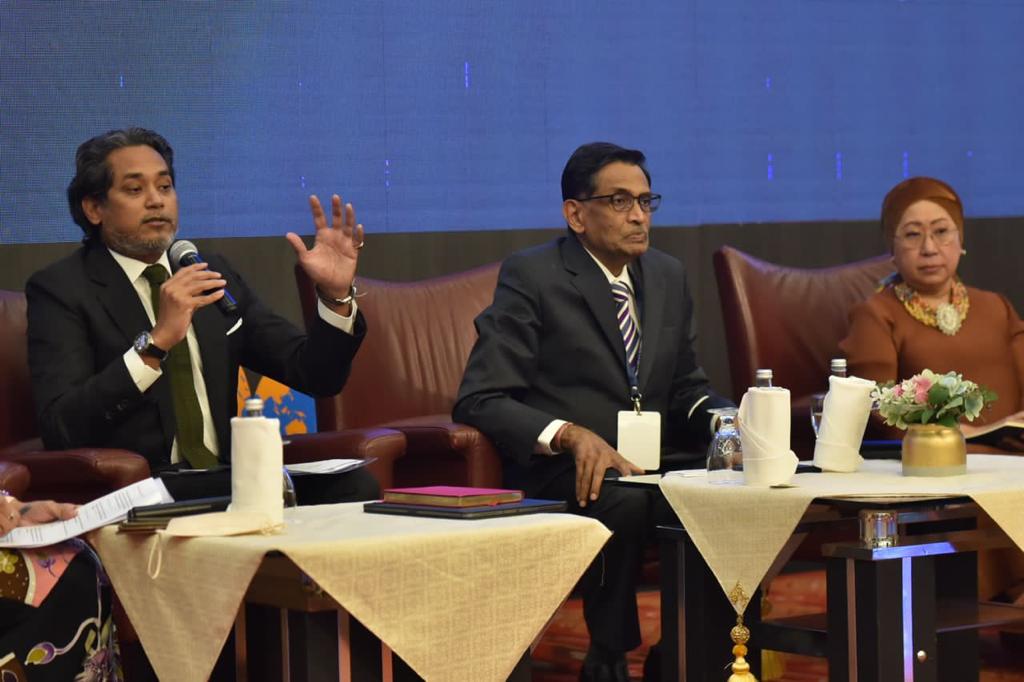KUALA LUMPUR, August 16 – Khairy Jamaluddin said today he has asked the Ministry of Finance (MOF) to ensure that the Ministry of Health (MOH) receives a bigger budget for next year compared to this year’s allocation.
The health minister pointed out that MOH is planning to build the most number of new hospitals this year that will lead to an automatic increase in overheads, thus necessitating a “commensurate increase in budget”.
“As far as the Ministry of Health is concerned, we have asked MOF that the allocation for 2023 should certainly not be less than 2022,” Khairy told a press conference here today after the end of the two-day Health Policy Summit 2022 organised by MOH.
“We are requesting a decent increase based on the increase in health care burden that we face post-Covid in terms of backlog, new facilities that are coming on stream.
“2022 is a very important year for us because this year, we are adding the most number of hospitals this year.”
Despite the Covid-19 pandemic, MOH’s allocation under Budget 2022 tabled last October increased only by a meagre 1.5 per cent to RM32.4 billion from the 2021 budget.
When CodeBlue pressed the health minister if he would ask MOF for a specific quantum of increase for MOH’s 2023 budget, Khairy said he would meet Tengku Zafrul Aziz by month end.
At a policy dialogue at the Health Policy Summit earlier today, Khairy said doubling MOH’s annual budget of about RM32 billion – equivalent to under 2.6 per cent of Malaysia’s gross domestic product (GDP) – to at least 5 per cent of the GDP would mean a yearly allocation of RM70 billion.
He admitted at the conference of health care professionals the immense difficulties in boosting Malaysia’s public health care spending to 5 per cent of the GDP.
“It’s very difficult to get it because KKM has to compete with other ministries. Secondly, we are in a very tight fiscal situation. Your government revenue has shrunk…tax revenue has decreased, especially when we got rid of value-added tax or GST,” Khairy said.
“If you look at the government revenue situation, it’s going to be very difficult to try to get the 5 per cent, so you have to make tough political decisions.”
The health minister said such difficult decisions involved questions on redistributing tax revenue between ministries to prioritise public health and education, for example, or to reduce subsidies so that funding can be diverted to health care.
He pointed out that the federal government is spending RM80 billion out of its RM300 billion budget this year on subsidies alone.
“Some of them are necessary, some of them are essential to keep down food inflation, but going forward, don’t you want to spend some of that money, which is essentially regressive when it comes to petrol subsidies, on investments in health care?” Khairy questioned.
“These are trade-offs which have to be decided at the political level, and it must be communicated by the politicians to the public. Politicians have to be courageous, they will take a hit for it. But you have to explain that the money we save from this will be invested in public health care.”
When CodeBlue asked Khairy at his press conference to clarify if he was proposing a reduction in fuel subsidies or restoring the goods and services tax (GST) in order to be able to increase MOH’s allocation from general taxation revenue, the health minister said this was up to the Cabinet.
“These are decisions that have to be made by the Cabinet on how we distribute our revenue – whether that results in reallocating the revenue from other ministries, whether that results in finding new streams of revenue – those are questions that have to be discussed politically,” he replied.
“Specifically, these are some of the expenditures that are big-ticket items right now, subsidies, petrol subsidies. Whether those are targeted, that decision must be discussed politically; that’s in the realm of politics.”
Maximise General Taxation Revenue Before Exploring Social Health Insurance
On the contentious subject of health financing reform, Khairy proposed maximising health care allocations from general taxation revenue before considering other methods like social health insurance.
He said once MOH’s annual budget allocation reaches a certain percentage of the GDP and service delivery is adequate, the government can then start to think of other co-payment mechanisms for health.
“What it is, what it might be, what the rates are, these are things which have to be thrashed out at the political level and with all stakeholders,” Khairy told the panel discussion at the conference.
He noted that the massive public opposition to the 1Care social health insurance scheme about a decade ago – which former Health Minister Dr S. Subramaniam brought up at the panel discussion with Khairy – arose because details emerged in the public sphere seemingly “out of nowhere”.
Khairy stressed that any proposal for national health insurance must first be discussed across the country.
“If that is where we’re headed to, we exhaust everything else first, which is tapping on the general taxation pool. That must be the first,” he said.
“Above and beyond that, if we need more than that later, we must have a serious conversation. This is a national conversation about what the new social contract is as far as paying for health care, but not without exhausting us getting more from the general taxation pool. That must be the first strategy for us.”








